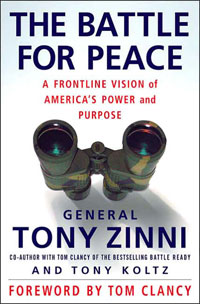Book Notes
 General Tony Zinni and Tony Koltz, The Battle for Peace; A Frontline Vision of America's Power and Purpose (New York: Palgrave Macmillan, 2006), 233pp.
General Tony Zinni and Tony Koltz, The Battle for Peace; A Frontline Vision of America's Power and Purpose (New York: Palgrave Macmillan, 2006), 233pp.
Anthony Zinni's forty-year career in the U.S. Marines spanned from the rice paddies of Vietnam as a twenty-two year old adviser to commander of the U.S. Central Command (CENTCOMM) where he was just as comfortable in presidential palaces. He has accumulated a lifetime of practical experience in more than seventy countries, not only as a warrior but as a diplomat, business man and university lecturer. Thus he comes to his opinions with the "muddy boots" of a seasoned practitioner.
The fall of the Berlin Wall in 1989 signaled a "New World Order" of expanding political peace and economic prosperity, but what really followed, says Zinni, at least for those with eyes to see and the candor to admit it, is a "New World Disorder." Since the fall of the former Soviet Union, there have been roughly forty wars, although almost none of them have been traditional military conflicts. Between 1945 and 1978 the United Nations conducted only thirteen peace-keeping missions, but between 1988 and the present that number tripled to forty-seven. (p. 86). Like it or not, says Zinni, America is now an empire with unparalleled influence, whether in information technology, culture, diplomacy, economics, entertainment, or military might. No one is our equal, and no one can play our role. Yet Zinni also believes that America is unsure how to wield its power wisely and well in this New World Disorder, and so he proposes a "new national purpose." Global peace will not emerge from passive neglect; it requires active intervention. Nor is it a natural state of affairs; it follows from exporting our best ideals (p. 178).
Zinni argues that we suffer from a failure of vision, and that instead of understanding others we project our own view of the world onto them. Many leaders look at the world today through the lens of the Cold War, where state actors engaged in military battles and indisputable victory was determined by vanquishing the enemy. It's quite possible that we will never fight another war like that. Rather, today global instability comes from a legion of demons—drug cartels, computer viruses, environmental degradation, failed states that descend into chaos and anarchy, currency meltdowns, natural disasters like Katrina or the Indonesian tsunami, epidemics like HIV-AIDS, ethnic rivalries, etc. The New World Disorder requires understanding our new context with fresh vision. Related to this, we also suffer from sclerotic, stove-piped, rival bureaucracies that are wedded to the old school vision. Even the new National Director for Intelligence and Homeland Security are unlikely to succeed, in his estimation, for they perpetuate past mistakes.
Thus I found it odd that Zinni proposes yet a new government bureaucracy, a "National Monitoring and Planning Center." But if the president turns a blind eye to intelligence experts, or spins intelligence to support pre-existing ideology; if the Pentagon ignores the wisdom of the State Department and its military; and if rival agencies continue to protect their turf, then why should we expect his proposed NMPC to succeed? Of course, he envisions that his NMPC will operate differently, but why should Washington ever abandon its "soda straw" view? He admits that his sweeping proposal is "radical," which is to say idealistic. Zinni has written a popular level book for a general audience, complete with a foreword by Tom Clancy and sixteen photos of himself. At times his prose meanders into generalities and bureaucratese, another oddity given that it was co-written by a professional writer. I wondered if the book was more an exercise in self-promotion than a serious proposal about complex problems where, as he knows so well, the devil is in the details. Still, The Battle for Peace is worth reading for its big-picture view of our world that has no political axe to grind.


